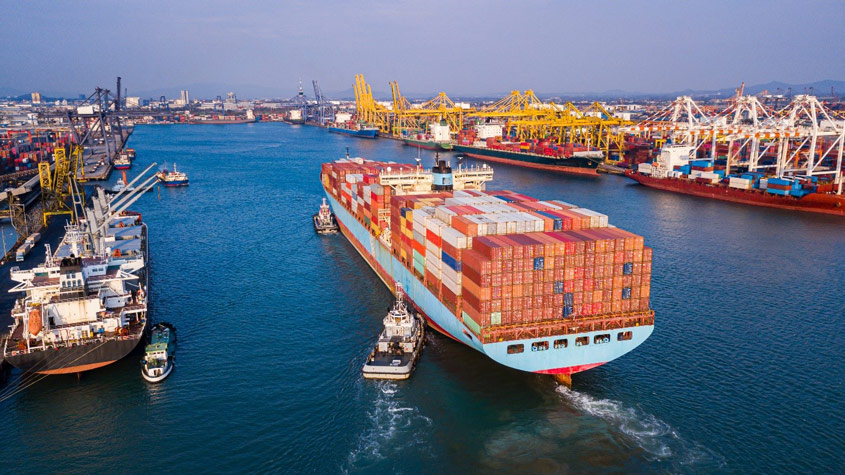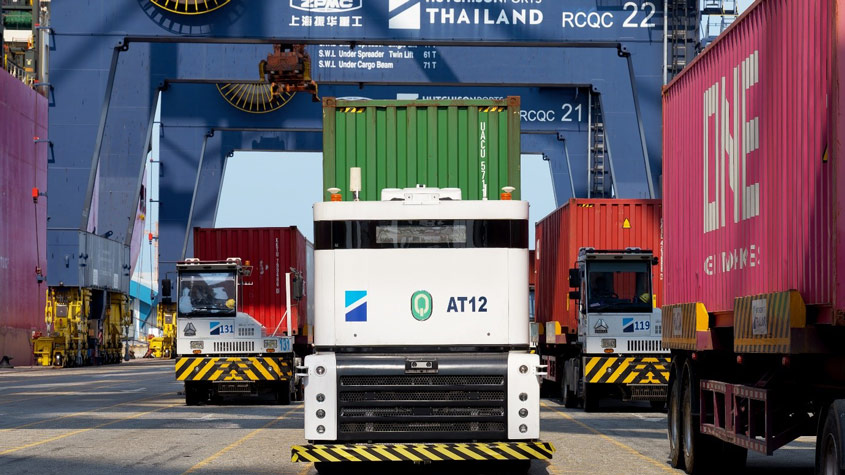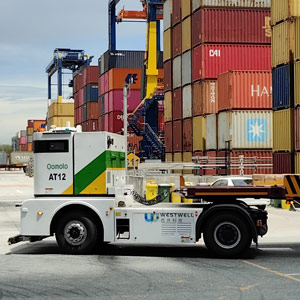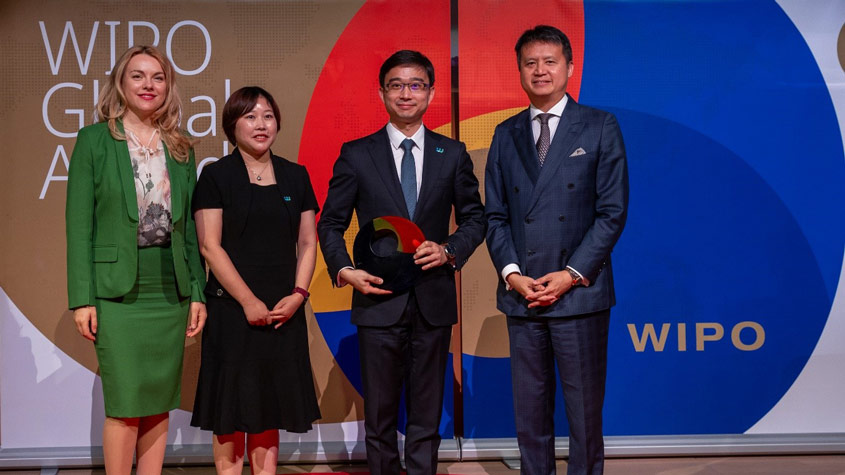
Westwell's Smart Port Technology For a Sustainable Supply Chain
By Catherine Jewell, Information and Digital Outreach Division, WIPO
Seaports play a pivotal role in the smooth running of the global supply chain that underpins international trade. The complexity of their operations and the pressing need to reduce pollution and cut waste makes them an ideal candidate for the advanced smart port solutions offered by Chinese AI logistics company, Westwell. WIPO Magazine recently sat down with the company’s President, Vincent Zhang, to learn more about how Westwell’s technologies are supporting the drive to decarbonize seaport operations around the world. Westwell is one of seven winners of the 2023 WIPO Awards.

Tell us about Westwell and its smart AI-based solutions for sustainable supply chain management
We established the company in 2015, when the market presence of AI technology was still in its infancy. At that time, we saw AI’s huge potential to support economic activity, enhance working conditions and generate environmental benefit. We targeted seaports for three main reasons:
- First, they play a key role in global logistics.
- Second, the many around-the-clock, repeatable tasks take place at seaports lend themselves to automation.
- Third, seaports are looking to improve their environmental performance.
With our solutions they can cut pollution, reduce waste and improve operational efficiency and working conditions while also bolstering their bottom line. Our ultimate goal is to leverage our smart and green AI-based technology to optimize and reduce the carbon footprint of the whole supply chain and eliminate unnecessary waste.
Our ultimate goal is to leverage our smart and green AI-based technology to optimize and reduce the carbon footprint of the whole supply chain and eliminate unnecessary waste.
We provide a range of smart new energy (electric) autonomous vehicles under our Qomolo® brand. These trucks are supported by battery swapping stations, which enable them to operate continuously, within a closed area, such as a seaport. We also provide a suite of AI-driven smart solutions under our WellOcean® brand to improve the efficiency of port operations, for example, in terms of planning tasks, truck routes and other logistics.

In 2016, we implemented our first AI application under our WellOcean® brand, a smart tally system, to automate the process of recording and tracking the movement of goods to and from container vessels. This is a demanding around-the-clock task that places workers in the high-risk ship-to-shore area, exposing them to accidents. By automating the task with our AI application, we can move it to the safety and comfort of the back office.
Since then, we have been working on Qomolo®, our holistic, smart and green solution to automate the transportation of containers within the port terminal. Our customizable autonomous Q-trucks use new (electric) energy instead of fossil fuels and can operate continuously thanks to our battery swapping stations.
Green energy is the future. But it’s not just a question of industry using new energy, they also need to think about how to run their business in a smart way to improve efficiency and cut pollution and waste.
Most of the company’s employees, around 70 percent of them, work on R&D, continuously enhancing the software, algorithms, and technology that drive our solutions. At present, we have 160 clients in 18 countries and expect to bring on board clients from another three countries this year.
How is Westwell’s smart transportation technology supporting the sustainability of seaports?
Green energy is the future. But it’s not just a question of industry using new energy, they also need to think about how to run their business in a smart way to improve efficiency and cut pollution and waste. With our Ainergy (AI + energy) strategy, we combine smart and green to provide a holistic solution for our customers. We are committed to delivering “intelligent + green,” high-precision transportation. In the case of pure green energy, for example, our driverless Q-trucks, which use this new energy, can achieve carbon reductions of up to 50 tons per year. As these fleets expand, so too will the environmental gains.

can achieve carbon reductions of up to 50 tons per year,
offering a smart way for seaports to cut pollution.
(Photo: Courtesy of Westwell)
And tell us about your approach to artificial intelligence and how it interfaces with the lives of workers?
At Westwell, our company slogan is “From human to human.” We are continuously expanding, optimizing and trying out our products to pinpoint the optimal relationship between AI and humans to support their daily work. That's why we focus on leveraging AI to automate tasks that are highly repetitive or that put workers at risk.
Our innovative AI-based solutions make it easier to manage the complex operations and logistics of a major port and make them greener. Imagine planning the routes of the hundred or even thousands of trucks as they load or unload ships in real time. With our solution, logistics planners can plot the movements of their whole fleet in real time, thereby improving operational efficiency, ensuring workers’ safety and cutting pollution.
Our innovative AI-based solutions make it easier to manage the complex operations and logistics of a major port and make them greener.
We offer a range of solutions and products for different scenarios. In ports or other hubs facing labor shortages, we provide an autonomous solution, which can also be used during holiday periods or for night shifts, relieving the demands on workers’ time. And in other cases, we provide manual-drive trucks with smart capabilities to help reduce accidents. In some scenarios, we have a mixture of manned and unmanned vehicles.
Can you give examples of seaports that are using Westwell’s smart port technology?
We have worked on a number of benchmark cases. For example, we have installed smart autonomous truck systems in Laem Chabang Port in Thailand, integrating a fleet of 20 Q-trucks with their existing conventional fleet to create the world’s first smart port under mixed-mode operation. We have also developed a smart port system for Khalifa Port in Abu Dhabi, (UAE), the first country in the Middle East to implement such a system, as well as in Qingdao Port and Tianjin Port in China. In Felixtowe, the UK’s largest port, we are providing vehicles to create the world’s largest autonomous vehicle fleet to date, and building battery-swapping infrastructure and other services to modernize the port and support its operations.
And what role does intellectual property (IP) play at Westwell?
IP is an integral part of our company culture. From the outset, we recognized that IP is one of our key assets and began building our IP team and developing our IP strategy. When you are in the business of innovation, you need a robust IP strategy, and you need to think about how to engage people to do the innovation, how to reward them, and so forth.
When you are in the business of innovation, you need a robust IP strategy.
We also realized that to build an innovative and creative company culture, we needed to have some tolerance for failure, especially at the Board level. This is important because it creates the space for researchers to try new things. That’s when innovative ideas emerge.
We have an open approach to innovation. In a globalized world with long industrial supply chains, you can’t go it alone. You have to work with your partners, including your customers. You need their trust and support to be able to apply the technology to their site and to keep innovating.
We work very closely with our customers. They provide the scenarios and we work on the technology. This gives them the product that meets their needs and makes them a market leader. We also work closely with our suppliers, with external consultants to hone our IP strategy and with government IP departments. At Westwell, we support innovation by ensuring our IP strategy is robust, by nurturing a culture of innovation at the corporate level and by leveraging our IP to get a return on our R&D investment.
Westwell is a frequent user of WIPO’s Patent Cooperation Treaty and the Madrid system for the International Registration of Trademarks. From your experience, what are the main benefits of these systems?
For companies that want to expand into international markets, WIPO's international IP services for patents, brands and designs are very useful. They are cost-effective and facilitate the process of securing IP rights in multiple countries.
Westwell’s Intellectual Property Portfolio
Intellectual property is integral to Westwell’s business culture and central to its commercialization strategy. Westwell’s extensive IP portfolio includes:
Patents and Utility Models
- 162 Chinese (invention) patents, of which 52 have been granted.
- 7 of Westwell’s patents are the subject of international applications filed under the PCT.
- 12 Chinese utility models (all granted).
Design rights
- 15 design patents (of which 14 have been granted).
- 2 industrial designs registered under the Hague System.
Trademarks
- 128 Chinese trademarks.
50 trademarks are the subject of international applications filed under the Madrid System. To date, three trademarks in 10 categories have been successfully registered in the European Union.
Copyright
- 29 registered copyrights.
As an actor in the rapidly evolving AI sector, how would you like to see the IP system evolve?
AI is developing very quickly and the technologies we develop have a short lifecycle. Yet, the current IP system is a lengthy process. Often, by the time we secure IP protection the technology is already obsolete. This is a real challenge for companies working in the AI field. It would be very helpful for policymakers, and WIPO, to think about how the IP system can better support the development of AI technologies and the IP needs of the companies developing them.
What advice do you have for startups working in AI field, especially in relation to IP?
IP is very important, especially for the technology-based SMEs and startups. When you start your business, you can easily overlook the need for an IP strategy because your focus is on developing your product and getting it to market. But early development of your IP strategy will put you in a stronger position to take advantage of commercial opportunities down the line.
What does it mean for you to be a winner of the WIPO Global Awards 2023 and will the Award support your future plans?
It’s our honor to win this Award. It’s recognition of years of effort and the achievements of our team and a great motivation to continue our work. The Award will help build our brand recognition, which will enable us to bring more smart and green solutions to the market.
We feel a great responsibility to share our insights and experiences with SMEs and startups working in similar areas to help them better understand how to leverage IP to support their business goals.
The Award will help build our brand recognition, which will enable us to bring more smart and green solutions to the market.

And what are your plans for the future?
We plan to apply our solutions to railway hubs, land ports and airports to help them overcome the operational, sustainability and labor force challenges they share with seaports. We will continue leveraging our smart, AI-based solutions for container logistics to cut pollution and reduce waste so the global supply chain becomes more sustainable.
Winner of the WIPO Global Awards 2023
Westwell is one of the seven winners of the WIPO Global Awards 2023. This annual competition identifies exceptional small and medium-sized enterprises that are making smart use of IP rights to achieve their business goals while also harnessing their innovation and creativity for the good of society.
This year’s winners came from China, France, Kenya, Mexico, Singapore and Slovenia. The winners stood out for their creative and forward-thinking approaches, which demonstrate the transformative potential of IP in shaping our common future.
The WIPO Magazine is intended to help broaden public understanding of intellectual property and of WIPO’s work, and is not an official document of WIPO. The designations employed and the presentation of material throughout this publication do not imply the expression of any opinion whatsoever on the part of WIPO concerning the legal status of any country, territory or area or of its authorities, or concerning the delimitation of its frontiers or boundaries. This publication is not intended to reflect the views of the Member States or the WIPO Secretariat. The mention of specific companies or products of manufacturers does not imply that they are endorsed or recommended by WIPO in preference to others of a similar nature that are not mentioned.